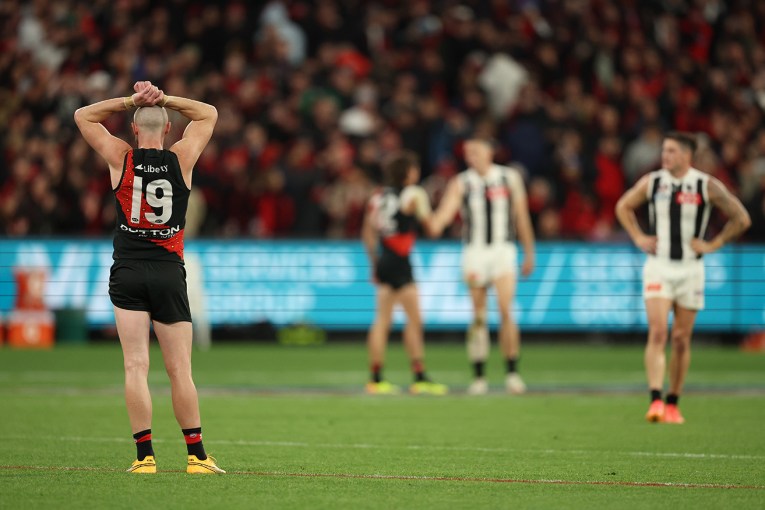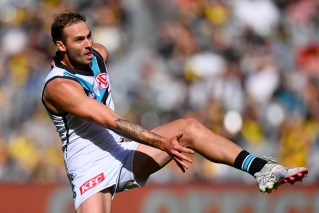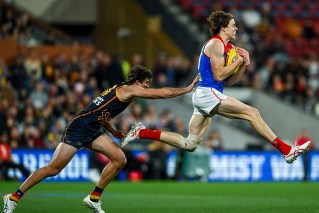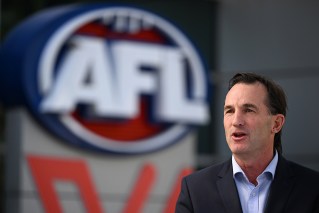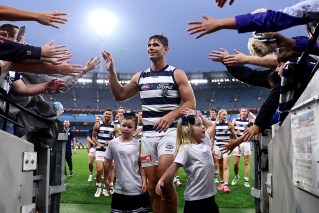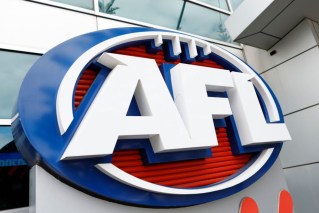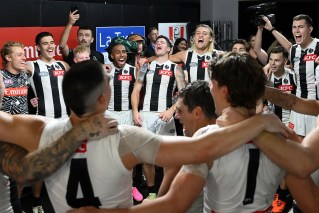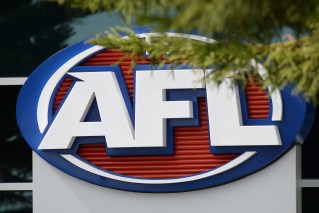Why this may be the Hawks’ greatest triumph


This may have been Hawthorn’s greatest day.
Another premiership, the 12th, and back-to-back flags for just the second time in club history is an amazing performance.

Three-time premiership player and dual Norm Smith Medallist Luke Hodge. Photo: Getty
But not even the incredible Hawthorn teams of the 1980s, winner of five premierships from 1983-1991, had to endure the hardship that Al Clarkson’s team had to work through in 2014.
This flag goes to the top of the bunch, sitting comfortably with the breakthrough premiership of 1961 and the audacious heist over Geelong in 2008, and the gladitorial win over Geelong in 1989.
• Swans disgusted and embarrassed
• The grand final in pictures
• Player ratings: heroes and villains
Not even in the days of Brereton and Dunstall and Tuck and DiPierdomenico and Platten and Ayres had the club been required to overcome an injury blight that burned so badly, on top of the defection of the club’s most famous and arguably best player, Lance Franklin, on free agency to a respected opponent for the pittance of a No. 19 draft selection as compensation.
Clarkson’s removal from work duties with a serious blood disorder in the middle of the season, Sam Mitchell’s bad hamstring injury, Cyril Rioli’s constant hamstring tweaks and Brian Lake’s long suspension are but some of the obstacles that pushed against Hawthorn going back-to-back.
But ultimately they proved unstoppable.
In his speech after the game, Clarkson said Hawthorn did it “the hard way” and it is fitting that this is the name of the club’s official history. In hospital in June battling Guillain Barre syndrome, Clarkson answered a text message on his telephone that came from Mitchell which quoted his favourite line about one soldier down, another steps up.
And so it happened. Vertically-challenged Brendan Bolton stepped into the coaching role and went five-for-five, and Clarkson recovered more quickly than expected. He is now a triple premiership coach, joining the legendary Allan Jeans and John Kennedy senior among Hawthorn coaches.

Son of a gun: Will Langford, son of Hawks legend Chris, was the outstanding young player on the ground. Photo: Getty
Hawthorn won by a whopping 63 points before 99,454 people at the MCG and, in truth, it was a dud grand final because the Hawks were too good and Sydney inexplicably, impossibly poor from start to finish. The margin was the equal-ninth-biggest in history, and left Sydney co-captain Jarryd McVeigh “disgusted” afterward.
This one will cut the Swans deeply, having finished on top of the ladder and breezed into the grand final, yet performed so badly on the day. This was last thing you would have expected of such a proud club and a strong group.
Lance ‘Buddy’ Franklin kicked four goals and was one of the club’s best players on the day, but he suffered for lack of opportunity; Hawthorn had a foot wedged on the supply line and Brian Lake flying third-man-up to help Josh Gibson in that task.
Hawthorn started well, led by 20 points at quarter-time and just kept increasing the lead, from 42 at half-time, to 54 at the last change and finally 63 points. The entire last quarter became a celebration of Hawthorn superiority, a rare luxury for a grand final.

Former Eagle and Swan Matt Spangher, a perennial grand final emergency, was a bridesmaid no more. Photo: Getty
Hawthorn knows the Swans’ feeling well; it finished on top in 2012 but lost the grand final.
The AFL’s finals system requires the best team of the regular season to step up again; the English Premier League it is not.
In the biggest game of the year Sydney butchered the football under relentless Hawthorn pressure, went away from its usual game style – having just seven tackles in the first quarter and only 57 for the game – and produced its worst performance of the season.
A team that conceded just nine goals a game during the season gave up 21 goals to Hawthorn on the day. “We didn’t give a yelp,” said McVeigh.
Conversely, Hawthorn’s best players all fired. “It’s a dream,” said Jarryd Roughead, a star up forward for Hawthorn again. “We couldn’t have done any better.”
Luke Hodge, Hawthorn’s inspirational captain, rightly won a second Norm Smith Medal for best player afield, his 35 disposals and two goals not necessarily explaining everything about the way that he cajoled and encouraged his teammates to this triumph.
But it could just as easily have gone to Jordan Lewis, who bullocked through midfield and gathered the football 37 times, or to Sam Mitchell, who kept digging the ball out of stoppages all day, or the newcomer Will Langford, who kicked three goals including a freakish, bouncing snap from a near-impossible angle in the third quarter.
Roughead kicked five goals from deep forward and Shaun Burgoyne was a general through the midfield and off half-back.
Hawthorn had 22 contributors and Sydney far fewer, which was the key.
How ironic that from 2012, when these same teams played off, each morphed into the other. Franklin defected, and Hawthorn developed a more even spread of goal kickers and a more even-handed approach where, in 2012, it had lost a grand final because its last half-dozen players were not up to the mark.

Former Saint Ben McEvoy’s late inclusion proved critical. Photo: Getty
Fast forward to 2014 and Sydney boasted huge top-end talent but relied on too few; the Swans could not draw enough from the likes of Lewis Jetta – albeit the Western Australian suffering a head knock – or from Gary Rohan, whose kick-out directly into the hands of Hodge for a goal in the second quarter was symbolic.
Sydney’s younger players like Rohan and Jake Lloyd and Harry Cunningham appeared to suffer from nerves. Meanwhile, Hawthorn had 10 goal kickers and not one bad player.
There were some great grand final stories:
• Hawthorn now has six triple premiership players (Hodge, Mitchell, Roughead, Lewis, Grant Birchall and Cyril Rioli) from the Clarkson era, and another, Burgoyne, can add his one flag from Port Adelaide to two at Hawthorn for his three.
• There were new premiership heroes, such as Matt Suckling, who missed the 2013 grand final as he recovered from knee surgery, and Ben McEvoy, who played at St Kilda without premiership success, and whose inclusion at the expense of Jon Ceglar proved to be important.

Sydney was impossibly, inexplicably bad from start to finish. Photo: Getty
• There was the tough, little Taylor Duryea, who came off the substitute’s bench, and Langford, who ran hard through out and put his nose over the football, the son of a club legend and now a premiership player, too.
• Then there was Matt Spangher, the half-back who had served as an emergency to three premiership teams at three different clubs before this game. Spangher drew roars of approval from the crowd every time he approached the football; his road has been the hardest of all, with three clubs in seven years and just 51 games of football.
Hawthorn is a remarkable operation, a machine that is superbly conditioned and tended and steered. It has 12 premierships in the 50-odd years since the breakthrough flag of 1961, and that is four ahead of any other club in the competition in the same time.
“We’ve had a bit go on this year,” said Hodge, with his trademark understatement. “It just goes to show that the blokes who are asked to step up are more than capable. That’s why we got the result today.
“Leading in, a lot of people didn’t give us a chance, but we take confidence in that. If they want to, I guess, turn their back on us, it gives us confidence. We stick together. Another great four-quarter effort.
“We sat down at the start of the year, it was a good effort, what we did last year, but to back it up, aim for top four, give ourselves a second chance. We were able to tick those boxes this year, no matter what happened with the club, we were able to stay focussed and play great team football.”
Clarkson praised his team for a four-quarter effort. “We had to overcome some real obstacles through the course of the year,” said Clarkson. “It’s fitting reward for this group. They are fitting premiers, I think.”
Martin Blake’s votes
3 Luke Hodge (Haw)
2 Jordan Lewis (Haw)
1 Sam Mitchell (Haw)
